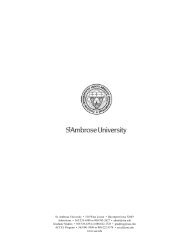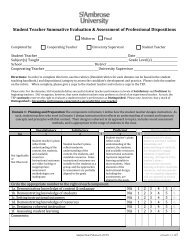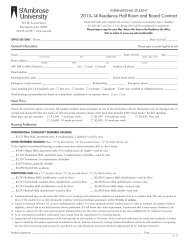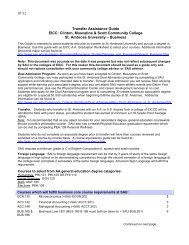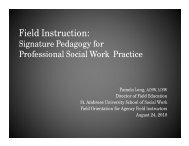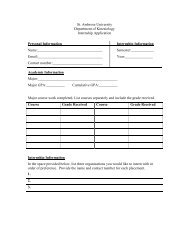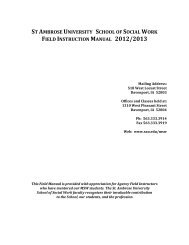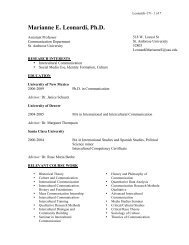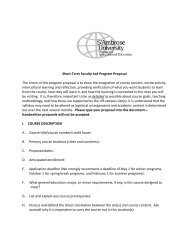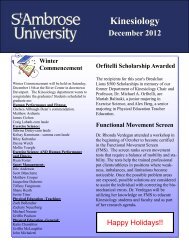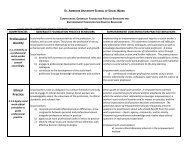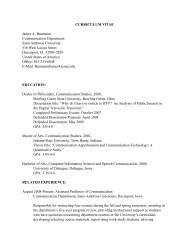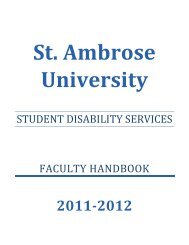St. Ambrose University 518 West Locust Davenport Iowa 52803 admit
St. Ambrose University 518 West Locust Davenport Iowa 52803 admit
St. Ambrose University 518 West Locust Davenport Iowa 52803 admit
Create successful ePaper yourself
Turn your PDF publications into a flip-book with our unique Google optimized e-Paper software.
Undergraduate Programs<br />
meanor convictions before registration for licensure<br />
exam.<br />
Course Descriptions<br />
NURS 150. Introduction to Nursing 1 credit<br />
This course provides an introduction to a number<br />
of topics baccalaureate-nursing students will use<br />
as they progress through the nursing major.<br />
Prerequisites: None required for a student with a<br />
declared nursing major. Department approval<br />
required for non-majors.<br />
NURS 160. Nursing Interventions I 2 credits<br />
This course will introduce the entry-level student<br />
to basic concepts and interventions related to the<br />
practice of nursing. Legal/ethical considerations<br />
are explored in each content area. Prerequisites:<br />
Non-nursing majors need department permission.<br />
NURS 260. Nursing Interventions II 2 credits<br />
Nursing Interventions II builds on and continues<br />
to develop the theory and skills related to nursing<br />
interventions. Observational experience for this<br />
course includes: medication administration by an<br />
RN, and a perioperative experience.<br />
Prerequisites: NURS 160. Non-nursing majors<br />
need department permission.<br />
NURS 300. Health & Physical<br />
Assessment<br />
3 credits<br />
This course provides a theoretical basis and<br />
assists the student to develop beginning skills in<br />
the performance of health and physical assessment.<br />
Utilizing nurses’ holistic approach, the student<br />
learns data collection techniques that<br />
include physical examination, interviewing, and<br />
obtaining a health history. By the end of the<br />
course the student will be able to perform physical<br />
examination of the respiratory, cardiovascular,<br />
neurological and musculoskeletal systems.<br />
Focused head and neck and abdominal examination<br />
will be included. Additionally, the student<br />
will be able to teach breast and testicular selfexamination.<br />
Prerequisites: NURS 160.<br />
Department approval required for non-majors.<br />
NURS 310. Pathophysiology<br />
RN<br />
4 credits/3 credits<br />
This course provides students with basic information<br />
about pathophysiologic mechanisms, manifestations<br />
of disease, treatment for specific diseases,<br />
and the body’s response to those treatments.<br />
The general organization of each alteration<br />
includes risk factors and epidemiology,<br />
pathophysiology, clinical manifestations, and<br />
selected review of treatment. Prerequisite: BIOL<br />
202.<br />
NURS 350. Nursing the Beginning<br />
Family<br />
3 credits<br />
This course introduces the learner to the physiological<br />
and psychosocial changes that occur in<br />
women and families during the childrearing period.<br />
Concepts related to the normal antepartum,<br />
intrapartum, postpartum, and care of the newborn<br />
will be addressed. Learning to be advocates<br />
for the woman and her family during the childbearing<br />
period will be important as students<br />
explore cultural, financial, ethical, legal, and<br />
political issues. Prerequisites: NURS 310, PSYC<br />
305, and concurrent with NURS 352.<br />
NURS 351. Nursing Developing Family 3 credits<br />
This course will apply growth and development<br />
principles with family systems theory to the<br />
assessment, intervention, and evaluation of outcomes<br />
in the pediatric patient across the continuum<br />
of care. Basic to the care of the pediatric<br />
patient, fundamental differences in the physiological<br />
and psychosocial aspects of the pediatric<br />
patient will be covered based on age, developmental<br />
norms, and disease processes. Learning to<br />
be advocates for the pediatric patient and the<br />
related family unit will be essential as students<br />
explore the familial, cultural, ethical, political<br />
and legal forces that impact children’s health.<br />
Prerequisites: NURS 310, PSYC 305, and concurrent<br />
with NURS 352, 350.<br />
NURS 352. Nursing Interventions III 1 credit<br />
This course focuses on the theoretical and psy-<br />
131



